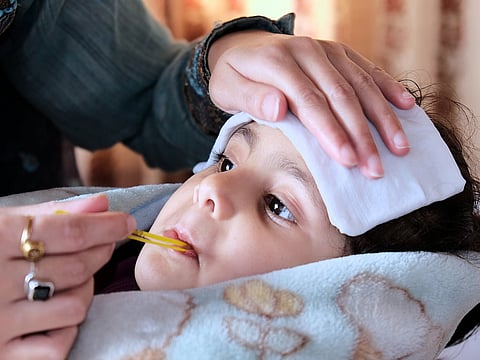UAE Health Ministry urges residents to get annual flu shot as winter nears
Six groups identified in UAE as most at risk of contracting seasonal influenza

The ministry said influenza vaccines offer an estimated 70% to 90% protection against clinical infection in healthy adults. Vaccination also helps cut down hospitalisation and death rates linked to flu-related complications.
According to the ministry, those strongly recommended to receive the vaccine include senior citizens, children aged six months to five years, pilgrims, pregnant women at any stage of pregnancy, individuals with chronic diseases such as heart, lung, kidney, liver, blood, or neurological conditions, as well as healthcare workers.
Seasonal influenza awareness guide
In its newly released 2025–2026 Seasonal Influenza Awareness Guide, MoHAP urged everyone to get vaccinated before the start of winter.
The guide highlights seven key preventive measures:
Get vaccinated.
Cover your mouth and nose when coughing or sneezing.
Stay home if you have a fever or flu-like symptoms.
Avoid direct contact with infected people.
Wash and sanitise hands regularly.
Avoid touching your eyes, nose, or mouth.
Clean and disinfect frequently touched surfaces and objects.
Symptoms and transmission
Seasonal influenza is described as an acute respiratory infection caused by influenza viruses that circulate worldwide during specific seasons. These viruses belong to the Orthomyxoviridae family and are classified into three main types: A, B, and C.
Symptoms usually appear suddenly and include fever, headache, fatigue, cough, muscle and joint pain, sore throat, and nasal discharge. Children may also experience vomiting or diarrhoea.
While most people recover within a week, some — especially those in high-risk groups — may develop severe illness requiring hospitalisation.
The incubation period typically ranges from one to four days. The virus spreads through droplets produced when an infected person coughs, sneezes, or talks, or indirectly by touching contaminated surfaces and then touching the mouth, nose, or eyes.
Safe and effective protection
The annual flu vaccine is given as an inactivated (non-live) injection and becomes effective about two weeks after vaccination. It helps reduce flu-related hospitalisations, protects pregnant women during and after pregnancy, provides newborns with early immunity, and shields families and communities — particularly those with vulnerable memers.
MoHAP confirmed that influenza vaccines have a long-standing record of safety and reliability, having been used worldwide for over 60 years. Reported side effects are generally mild and short-lived, including soreness at the injection site, mild headache, or a low-grade fever.
Global impact
Citing World Health Organization (WHO) data, the ministry noted that seasonal influenza is among the most common infectious diseases globally, affecting 5–10% of adults and 20–30% of children each year. It causes an estimated 3–5 million severe cases and 290,000–650,000 respiratory-related deaths worldwide annually.
Research shows that flu vaccination can reduce the severity of illness and hospital admissions among the elderly by 25–39%, and lower overall mortality by up to 75%.
Public urged to get vaccinated
MoHAP encouraged all UAE residents — especially those at higher risk — to get their annual flu vaccine without delay. It said vaccines are available at all public and private healthcare centres across the country and reaffirmed that vaccination is a crucial step in protecting individuals and the wider community from the risks and complications of seasonal influenza.
Sign up for the Daily Briefing
Get the latest news and updates straight to your inbox




